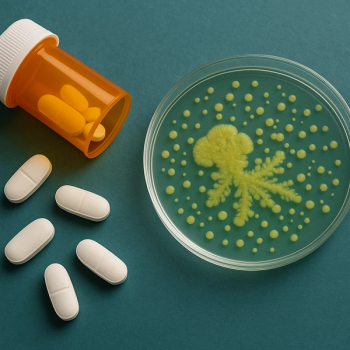
Fecal Microbiota Transplantation (FMT) for Treatment of C. difficile Infection (CDI)
Drs Tom Lodise and Bincy Abraham provide an overview of fecal microbiota transplantation and long-term safety of FMT use.
Episodes in this series

Paul Feuerstadt, MD:Let’s shift gears, we spoke about antimicrobials, which treat the vegetative phase. We spoke about bezlotoxumab, which essentially binds toxin B and decreases the inflammatory response. But we have that black box, that dysbiotic state, that second piece that we need to be healthy to reduce future recurrence. Tom, can you walk us through fecal microbiota transplant in detail? Its mechanism of action, and which patients may benefit from it?
Thomas Lodise, PharmD, PhD: As the name suggests, it’s the delivery of human donor stool to a person via a colonoscopy, an enema, a nasal gastric tube, or a nasoduodenal tube, or a capsule popularly known as the poop pill. It’s prescribed for patients with debilitating GI infections, like C difficile, and that’s why we’re here today. The thought is you restore a balance in the microbiome. You want to get a better proportion of healthy vs unhealthy bacteria. We’re trying to go back from a dysbiotic state to eubiosis.
Paul Feuerstadt, MD:Essentially, we’re taking those deficiencies—the firmicutes and Bacteroidetes—and we’re replenishing them with a full complement. What that does metabolically is alter the bile salt milieu. The bile salt milieu, we believe, has switches that turn C difficile on or off. In the appropriate complement of bacterial phyla, we can shift C difficile off and allow the microbiome to the opportunity to eradicate C difficile.
Bincy, we’ve seen fecal transplant. It’s been around for centuries but largely in clinical medicine over the last 10-plus years. Are there any safety signals we need to be concerned about with fecal microbiota transplantation?
Bincy Abraham, MD, MS: Good question. Patients have asked us this as well. The bottom line is that FMT [fecal microbiota transplantation] seems to be safe in the long term. Our biggest concern was the risk of infections. We’re bringing in stool, which has tons of bacteria, but we’ve looked at that by the donors, going through a vigorous testing to rule out any infections specific from the donor. In fact, there’s very low risk of transmission of infections with FMT when appropriately done.
On review of literature, looking at other potential long-term safety [concerns], some cities suggest a risk of report weight gain. That was unrelated to the donor BMI [body mass index]. Even the skinny donors contributed to weight gain in these patients. That happened in up to 10% of patients. This brings up the question: is it a direct effect? Or could it be that patients lost weight or weren’t gaining weight because of recurrency of infections and being unhealthy in general? There were also some reports of GI diseases, such as chronic diarrhea or irritable bowel syndrome, in about 13%. We need to keep that in mind, but no mortality was found looking at long-term safety of FMT.
Paul Feuerstadt, MD:It seems very safe. There are a couple of reports from the FDA that looked at transcription of various bacteria that weren’t properly screened for. You alluded to this, but whenever we consider fecal microbiota transplant, or FMT, it’s important to think about where we’re gaining the source stool, what process they’re going through, and how comprehensive their process is.
Transcript edited for clarity
Newsletter
Stay ahead of emerging infectious disease threats with expert insights and breaking research. Subscribe now to get updates delivered straight to your inbox.






































































































































